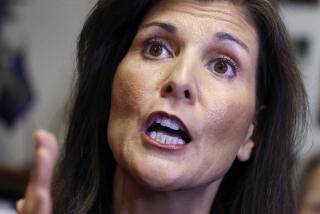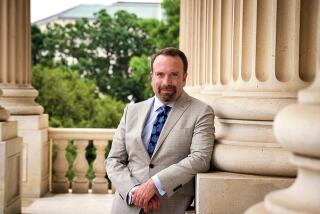COLUMN RIGHT/ TOM BETHELL : ‘Isolationist’ Won’t Stick on Buchanan : ‘Trying to perfect others is presumptuous. It has long been a leading cause of war.’
- Share via
Eighteen months ago, a great split appeared in the conservative ranks between those who saw the end of the Cold War as an opportunity to return to the principles of limited government and those who sought to justify continued American intervention around the globe. The former opposed the war against Iraq and were instantly dubbed isolationists. Their leading spokesman was columnist Patrick J. Buchanan, who is now running for President.
Interventionists, both liberal and neoconservative, promptly went on the offensive. The 50th anniversary of Pearl Harbor was commemorated as an object lesson in unpreparedness. Frequent parallels with the 1930s were drawn. Columnist David S. Broder argued that President Bush “should really enjoy squashing” the “threat” posed by today’s isolationists.
But when Bush went to New Hampshire last week, he didn’t bring up the subject. His handlers recognize that domestic matters are uppermost in people’s minds. And when Buchanan was in California a few days ago, he said he has found that isolationism is not an issue with the voters. Some think that it means cutting America off from the rest of the world, and they know that’s not a good idea, he said. But when they find out that Buchanan wants to cut off U.S. aid to foreign governments, they are all in favor of that.
On the stump, he seems to be trimming his “isolationist” sails. He told the San Francisco Chronicle that he would support covert action to get rid of Iraq’s Saddam Hussein, and in other respects he seems more activist than Bush. Speaking to a group of Croatian-Americans in Burlingame, Calif., Buchanan said: ‘I’ll tell you what I’m going to do in the campaign: Every time the question, ‘Pat Buchanan, are you an isolationist?’ comes up, I’ll say, ‘Listen, I’m for recognizing the independence of Croatia.’ ” (Bush is still reluctant to do so.) As President, Buchanan added, he would “send the Sixth Fleet on a courtesy call to Dubrovnik,” the historic Adriatic port city that has been caught in the recent fighting between Serbia and Croatia.
Buchanan is vulnerable on the issue of trade protection, in which his support for government intervention belies his generally anti-government posture. But the charges of isolationism that have been directed at him will not stick. In the absence of context--specific relations with specific countries--the accusation is meaningless. In the 1930s, frequently compared with today, there was at least an ascertainable enemy. Germany and Japan were moving aggressively in the world, and the idea of empire was still very much alive. Today there is no major aggressor in sight, and the age of empire is over.
These issues were prominent last weekend at a meeting of the John Randolph Club in Virginia. Participants included many of those who have provided intellectual support for the Buchanan campaign--Murray Rothbard and Lewellyn H. Rockwell Jr. of the Ludwig Von Mises Institute, and Thomas Fleming of the Rockford Institute. “With the collapse of the Soviet Empire,” said Fleming in his keynote speech, “we have for the first time in 60 years an opportunity to . . . decide once and for all whether we shall return to the republican principle of minding our own business, both individually and collectively, or whether we shall become the tame and abject slaves of a new international order that is being openly preached by our ruling class.”
Randolph Club participants are conservatives who mostly supported the Cold War--but reluctantly. They believe that in normal circumstances government should confine itself to protecting life, liberty and property. Faced with the Soviet threat, however, they put their limited-government principles in abeyance. Now they are finding that their erstwhile neoconservative allies during the Cold War were happy all along with our leviathan state, and are not eager to see it dismantled.
As for President Bush, he seems to see government as a limitless enterprise and because of that is anathema to Randolph Club supporters. Many of them would rather see a Democrat win in November. Fleming quoted Bush as saying last May: “What makes us Americans is not our ties to a piece of territory or bonds of blood. What makes us Americans is our allegiance to an idea that all people everywhere must be free.”
Must be? It is precisely this kind of moral ambition on behalf of distant people that made communism so dangerous. Trying to perfect oneself is laudable. Trying to perfect others is presumptuous. It has long been a leading cause of war. America should be content to let other nations work out their own salvation in their own way. In drawing attention to the dangers of such ideas, the isolationists (for want of a better term) perform an important service, and in the coming ideological wars on the right, they are likely to prevail.
More to Read
Get the L.A. Times Politics newsletter
Deeply reported insights into legislation, politics and policy from Sacramento, Washington and beyond. In your inbox twice per week.
You may occasionally receive promotional content from the Los Angeles Times.










